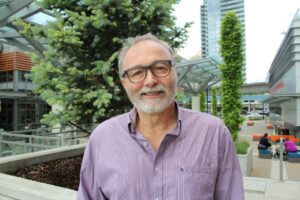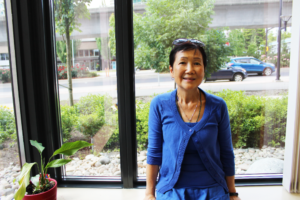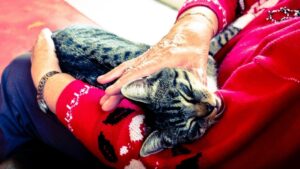Humans of Burnaby: Compassion

“I was born in Vancouver but moved to Burnaby when I was about 2 years old. My father built his house on the hill above Deer Lake, where I learned to swim. The neighbourhood children played in the large forest area which is now called Buckingham Heights. I learned to ride horses where the freeway is. There was a ranch at the corner of Canada Way and Burris, where we rented horses and took riding lessons for about $1 for a 30-minute lesson. To say the least, Burnaby has changed a lot in my lifetime.
My wife Susan and I have raised our two children here, and they both attended Burnaby Central, as I did, and my daughter attended SFU, as I did. Other than this continuity I am sometimes shocked at the huge changes to Burnaby and the massive growth of high rise buildings that seem to be creating walls across the city. Sometimes I get the feeling that these walls are dividing us. It’s important for Burnaby residents to realize that we all benefit from welcoming and inclusive communities. That’s the challenge; people think it’s a competition for resources; it’s either “them” or “us.” People feel threatened. The status quo feels threatened.
I try to work at being compassionate. One of the things that help me be compassionate is children. When I see somebody who is a hardened criminal, I think: You know, they were a little baby once. Innocent. What happened to them? And usually, there’s a reason for it some form of trauma in their early years. For me the greater future hope is that over time, in cities like Burnaby, all the children from diverse families will grow up speaking the same language, they’ll communicate, they’ll grow up knowing each other, they’ll be friends.”
Humans of Burnaby: The importance of community gatherings

“I go to the outreach center with a number of volunteers where we serve coffee and lunch to the homeless. We do this to make these people feel at home. When they are there they are anonymous. It’s giving them a place to have breakfast and lunch while socializing because
they are isolated. People say they have a lot of empathy but you really have to experience them and have no judgment. It is really not as simple as just calling them homeless. You are meeting people with health care issues, addiction, isolation, and mental health.
Some come for the social aspect of being a part of a community.
That’s one of the reasons why I teach Tai Chi at the Brentwood Community Resource Center; because of how it can attract a variety of people. Some who come have health issues such as Parkinson’s, pain management, insomnia, high blood pressure, asthma, and more. The Tai Chi set helps them stretch and work on a more open body, along with giving them space where they can share their issues and exchange experiences.
Community gatherings like this give people hope and the world needs more of that.”
Humans of Burnaby: The holes in our system

“First of all, my story is not unique. My life is one long saga about the holes in our system. I fell through the cracks and it’s almost impossible to crawl out. I taught aerobics in Kelowna, I managed a gym. I earned my own money and now all I am is an elderly beggar. I was an animal advocate for abused, lost and found animals. Now my life is about trying to survive.
I used to live in Surrey. One day, I was rushed to the hospital due to kidney failure and I ended up staying there for 9 weeks. After I came out of the hospital, I found out that my landlord wanted me to move out. I missed the notice because I was in the hospital. I also found out that my cat sitter had let her 19 year old son look after my apartment while I was away and he stole my mother’s jewelry, my jewelry, and my money which I thought was well-hidden.
Anyways, that’s why six years ago, I spent eleven months in different homeless shelters. You get 30 days in one shelter and then you have to go to a new one. I don’t know how many times everything I owned got stolen. At one point, I had no shoes, no bra and no shirts. I finally got a cellphone and one of my roommates took it and stomped on it.
At one shelter, a man dropped dead in front of me because of a heart attack. He was not a drug addict. He simply came out of the hospital and was homeless, like me. These poor people…there was no room for them in the hospital and they lost their home because they had no income and would end up in shelters, like me.”